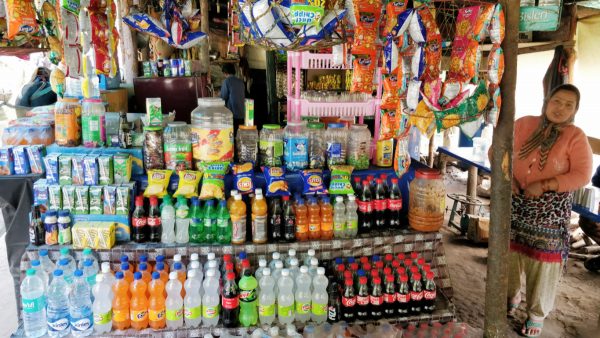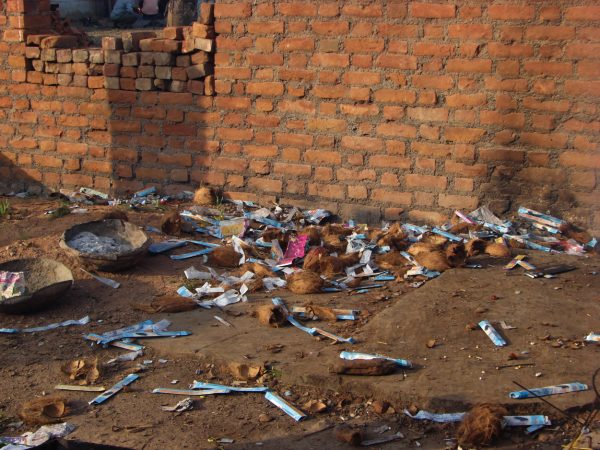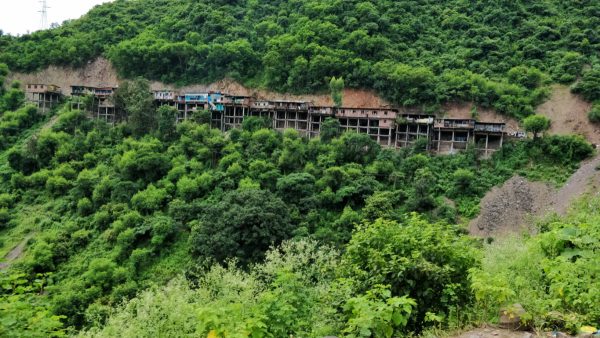From bugyals to river beds, every possible place where trekkers, hikers, and travel-enthusiasts go, one sees irresponsible behavior. I saw a massive pile of plastic bottles and heaps of rubbish down a slope near the prime temple in Sonagir a few years back. Every tourist attraction is literally choked with garbage that everyone assumes is hidden from view. Even places with difficult access, for instance, Kaza, have disposable plastic junk poised to choke the environment. There are two recent instances that have made me appreciate the Uttarakhand court decision to ban trekking in the Bugyals and also ban all water sports in the state.
The first instance happened as we were coming down from Budher caves near Chakrata… one young lady finished drinking water from her disposable plastic bottle and before anyone realized what she was up to, she had flung it wildly through the pine and fir trees and down a pristine slope. It was impossible to go down and pick it up and by the time we reached down she had already got into a cab and was gone.
The second incident worth a mention is when I came across not one but many young guys smoking while trekking to the Valley of Flowers. Each time, I stopped and said, ‘Hey buddy, spare this part of the world for God’s sake.’ Yes, they all did look sheepish and threw away the butts but the damage had already been done. One also keeps hearing of travelers spending evenings drinking and throwing the bottles down the slopes or worse, smashing them into mountain streams. This behavior is unpardonable and happens when the travel groups is led by people who have no respect for nature.
These are the sort of incidents that probably led a Lohajung based society called the Aali-Bedini-Bagzi Bugyal Sanrakshan Samiti to file a Writ Petition (PIL – Public Interest Litigation) in 2004 seeking to protect bugyals. Before we talk about the petition, the outcome and the resultant outcry, let me talk about bugyals. Bugyals, by the way, are mountain meadows and we loved the rolling slopes with no trees and just grass at the end of a tough climb through steep forested pathways while going to Budher caves. These are ideal places to set up camps during long treks. Uttarakhand has plenty of Bugyals and one sees the Bedni and Ali bugyals enroute to Roopkund, there is Dayara bugyal in Uttarkashi, the Auli bugyal and Gorson bugyal near Joshimath, Panwali Kantha bugyal near Guptkashi, and Kushkalyani bugyal on the way to Khatling glacier and Masar Tal, to name a few. Tungnath is another bugyal in Uttarakhand, and so are Rajrambha, Marjhali, Rajthor, Darmithor, Bishanthor, Galpari, Sankalpa, Yangchari, and Shibu Gwar. Even Alomora has the charming Erai bugyal.
Bugyals can generally be reached by trekking on steep paths because they are all at higher altitude… the valley of flowers is another example of gentle slopes with not just pastures but also flowers that make the place exceptional. Ghangaria is the base camp from where one can do day treks to the valley or even move up and visit Hemkund that has a lake from where the LaxmanGanga has its beginning and which meets river Pushpavati at Ghangeria. These are all places that are sensitive to anything that nature doesn’t appreciate and, therefore, we need to be careful about our actions.
Coming back to the petition and the order that decided on 21 August this year that overnight camping in meadows is disallowed until a tangible policy is in place, one can only agree with the judges. One of the earlier judgements also disallowed ‘camping sites on river beds. It pollutes the environment and ecology of the river and the surrounding areas’ and ‘banned all water sports, paragliding and white-water rafting in the state until a policy is framed to regulate these activities’. This June 18 order ‘directed the state government to prepare a transparent policy in this regard within a period of two weeks’ according to news reports. The judges were shocked at the environmental damage that these activities were causing.
We all know how popular treks and hikes have become but we also need to understand that popularity is leading a large number of travel enthusiasts and trekkers to reach out to these environmentally sensitive zones. This in itself can be the catalyst for long-term destruction of the eco-balance that must be maintained there. I am certainly in favour of regulating traffic to such places and there must be regulations that know how permanent camping sites can devastate these pristine sites.
This said, while going to Govindghat I also noticed the irresponsible way the mountains are being sliced to construct broader roads and the locals admitted that this was one of the reasons for the increase in the frequency and intensity of landslides. Such thoughtless plans have already destroyed a number of places and the Jammu-Srinagar highway, the highway to Shimla, and even the highway to Badrinath and Kedarnath are valid examples.
Protests by travel agencies like Indiahikes are certainly not resting on firm ground and so when they say that ‘what turned out to be an order that did not allow overnight camping on the meadows has now brought a complete stop to trekking in Uttarakhand. It sounds bizarre, but that’s how it is. No one can make out anything of this. And no one can go trekking’ they are miserably off the mark. Jayendra Singh Rana, president of Garhwal Himalayan Trekking and Mountaineering Association, is concerned about ‘cooks, mule operators, helpers, porters, who used to accompany the trekkers in their expedition to the high meadows and grasslands’ but he needs to understand that livelihood will anyway be snatched if irresponsible actions by trekking groups and travelers continue to play with nature. I found it rather heartless and criminal when travel group decision-makers sought evidence for tourism being responsible for the degradation of nature. The truth is that it is the irresponsible action of people that destroys nature. It is lack of a tangible government policy that destroys nature. What the courts have done is right because over a period of time even temporary camping sites tend to start behaving like permanent structures in places where they are not supposed to be. Haven’t we all seen the sort of chaos that the complicity of corrupt government officials with unscrupulous builders did to government land and sarkari parks by setting up massive pandals for weddings and other festivities. Over a period of time they all tend to stay there without being dismantled and this leads to a literal asphyxiation of helpless nature. These pandals in cities and on highways are what camping sites are to bugyals in Uttarakhand and elsewhere.

Everything comes in plastic containers, packages, and bottles and a lot of this garbage is disposed off in incorrect ways
The funny thing is that when you go through the protest pages on travel portals you also read their admittance to such degradation but by someone else. One such write-up says that ‘smaller groups dirty the most. So do the dhabas who have just sprouted up. They need to be regulated’. Yes, we did come across semi-permanent structures all through the trekking route from Govindghat to Ghangaria and noticed that they all sold stuff in disposable plastic bottles and packages and there was absolutely no sense of dealing with the daily trash that was produced by hundreds of travelers and pilgrims that passed through.
We need laws and we need the regulatory authorities to wake up and formulate policies on a war-footing. We need travelers to be more responsible. We need travel group leaders to be sensitive to the needs of the environment. We need to protect the environment, the bugyals, and even the river-beds. We need to protect mountain slopes from the onslaught of broader roads. We need to regulate the number of people rushing with trekking poles but no concern for the eco-system. We need to stop protests that are incorrect and care only for profits.
We also need to understand that blanket bans are not a brilliant solution to issues that nature with people.
.
.
.

You can see the camping sites on the outskirts of Ghangaria… however, the court order talks about these sites on bugyals
.
.
.
Arvind Passey
31 August 2018















8 comments
Dr.Amrita says:
Aug 31, 2018
Oh my God .Your post is exactly what I want to say!In Kashmir at Sonmarg and Gulmarg there is more plastic than snow!It’s a horror.What is infuriating is the people who do these things are unaware that they are killing their own selves one plastic bottle at a time.India’s population is impossible to discipline.Till it happend we may need bags to save India!
Sharing ?
Arvind Passey says:
Sep 4, 2018
Yes indeed, we are killing our own world ‘one plastic bottle at a time’… well said, Amrita. Thanks for reading this post.
Dr.Amrita BASU says:
Aug 31, 2018
Till it happens we may need bans to save India.
Arvind Passey says:
Sep 4, 2018
The word ‘ban’ sounds autocratic and harsh… but in the circumstances that we live in, the word certainly needs to be invoked several times and for multiple issues.
Shilpi Dutta says:
Sep 7, 2018
More than ban, we need responsible behavior. I collect the plastic bottles and trash on my treks but that will not help for two reasons- One, efforts should be on mass scale, individual efforts can barely solve the issue. Two- there is no waste recycle/management in place. The non bio degradable items collected ultimately end up in forest, water bodies, hills to lie there infinitely.
Arvind Passey says:
Sep 12, 2018
Yes, the process for getting back on track so far as being friends of the environment is concerned, is long and difficult. However, the right time to begin is now and any action, however small, will be fine… after all, small steps lead to habits that stay on. Thanks for reading this post… hope to see you on my blog again. 🙂
Namrata says:
Sep 7, 2018
informative post, keep updating
Arvind Passey says:
Sep 12, 2018
Thanks a lot, Namrata. Do visit my blog again. 🙂